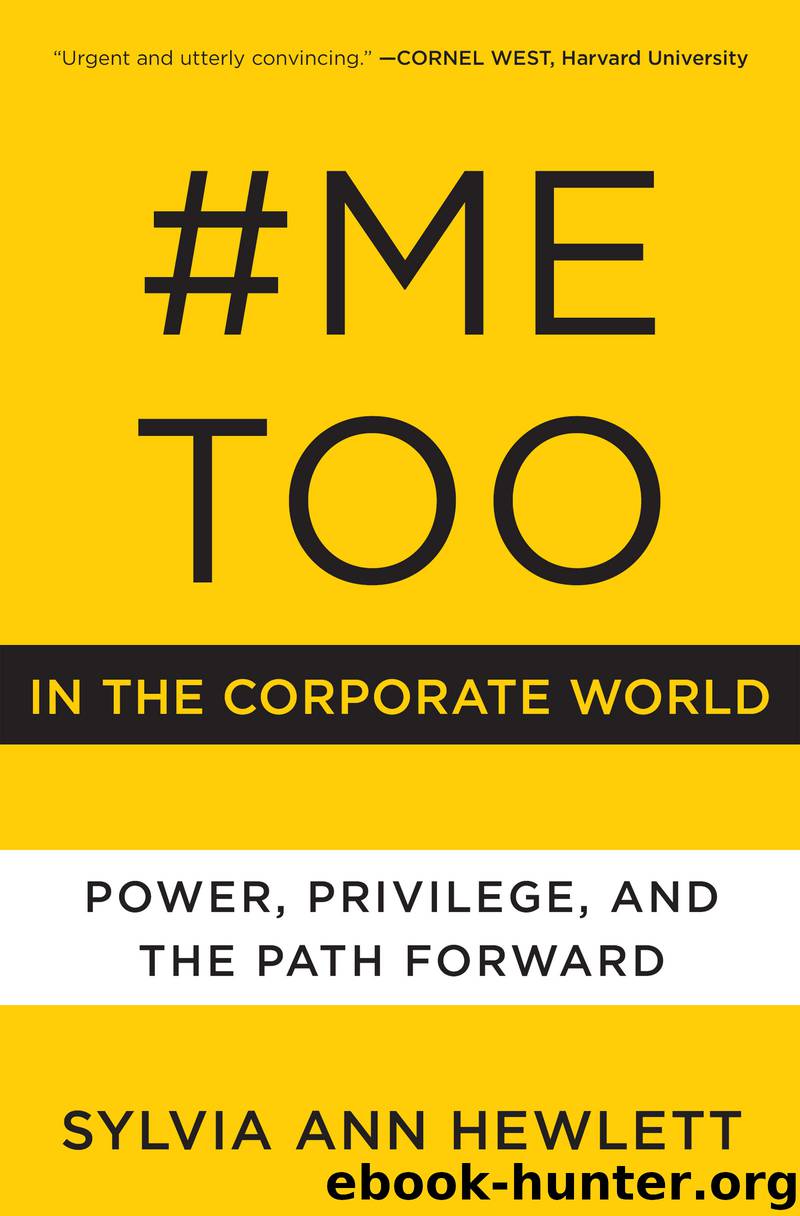#MeToo in the Corporate World by Sylvia Ann Hewlett

Author:Sylvia Ann Hewlett
Language: eng
Format: epub
Publisher: HarperCollins
Published: 2019-11-17T16:00:00+00:00
The report also calls for preventive laws mandating effective annual trainings for all supervisors and employees, and for funding of workplace “climate surveys.” These surveys assess the prevalence of harassment and discrimination in the workforce and increasingly are an important tool in addressing and preventing workplace violations.5
The Benefits of Accountability
Why has the financial services sector been relatively unscathed by the recent wave of sexual misconduct? One reason is the “Uniform Termination Notice for Securities Industry Registration,” typically just called the U5 form. If an employee registered with a broker-dealer or registered investment advisor is fired for cause, the U5—filed with the Financial Industry Regulatory Authority (FINRA)—lists the cause. This form then becomes part of an individual’s permanent record, which will follow him or her for the rest of their career.
As Bradford Hu explained to me, this acts as a serious deterrent. “If,” Hu says, “an individual is fired for unwanted advances toward a female subordinate, he will never work for another financial services organization. Potential employers get to see all of those reasons for past termination, and no one will hire that person. These are powerful consequences for misconduct: not just taking away a person’s job, but their future livelihood. And professionals in financial services understand this.”
CONGRESS UPGRADES LEGAL PROCESSES
In December 2018, congressional negotiators reached agreement to overhaul the system for punishing sexual misconduct in their ranks. Going forward, members of Congress charged with sexual misconduct will be required to pay out of pocket for at least some court judgments and settlements.6 (Previously, taxpayers footed the bill.)
In April 2019, legislators proposed legislation—shaped by a coalition of progressive groups led by the ACLU—called the BE HEARD (Bringing an End to Harassment by Enhancing Accountability and Rejecting Discrimination) in the Workplace Act. Its provisions include research on the economic impact of workplace harassment; mandatory reporting on the prevalence of workplace harassment; more access to training about what constitutes harassment and what defines employee rights; an end to mandatory arbitration and nondisclosure agreements; an expansion of civil rights protections to all workers, including independent contractors and interns; strengthened protections against discrimination based on sexual orientation and gender identity; more time to report harassment; legal assistance for low-income workers; no more caps on damages that an employer might be required to pay; and an end to compensation in the form of tips, because waiters and other tipped workers are disproportionately vulnerable to sexual harassment and discrimination by both clients and supervisors.7 At press time, lead cosponsor Senator Patty Murray (D-WA) and other cosponsors had turned their efforts to building more grassroots support for the act.
STATES AND CITIES ARE MOVING FASTER
Some state legislatures and city governments have been moving faster than Congress to adapt the law to fight sexual misconduct in the workplace. New York, for example, is in the process of enacting sweeping changes that include: extension of protections against sexual harassment and other human rights violations to employees in organizations of all sizes and to independent contractors; lowering the burden of proof so
Download
This site does not store any files on its server. We only index and link to content provided by other sites. Please contact the content providers to delete copyright contents if any and email us, we'll remove relevant links or contents immediately.
| African-American Studies | Asian American Studies |
| Disabled | Ethnic Studies |
| Hispanic American Studies | LGBT |
| Minority Studies | Native American Studies |
Cecilia; Or, Memoirs of an Heiress — Volume 1 by Fanny Burney(32544)
Cecilia; Or, Memoirs of an Heiress — Volume 2 by Fanny Burney(31941)
Cecilia; Or, Memoirs of an Heiress — Volume 3 by Fanny Burney(31928)
The Great Music City by Andrea Baker(31915)
We're Going to Need More Wine by Gabrielle Union(19033)
All the Missing Girls by Megan Miranda(15942)
Pimp by Iceberg Slim(14481)
Bombshells: Glamour Girls of a Lifetime by Sullivan Steve(14050)
For the Love of Europe by Rick Steves(13891)
Talking to Strangers by Malcolm Gladwell(13345)
Norse Mythology by Gaiman Neil(13343)
Fifty Shades Freed by E L James(13231)
Mindhunter: Inside the FBI's Elite Serial Crime Unit by John E. Douglas & Mark Olshaker(9317)
Crazy Rich Asians by Kevin Kwan(9275)
The Lost Art of Listening by Michael P. Nichols(7488)
Enlightenment Now: The Case for Reason, Science, Humanism, and Progress by Steven Pinker(7306)
The Four Agreements by Don Miguel Ruiz(6744)
Bad Blood by John Carreyrou(6610)
Weapons of Math Destruction by Cathy O'Neil(6264)
